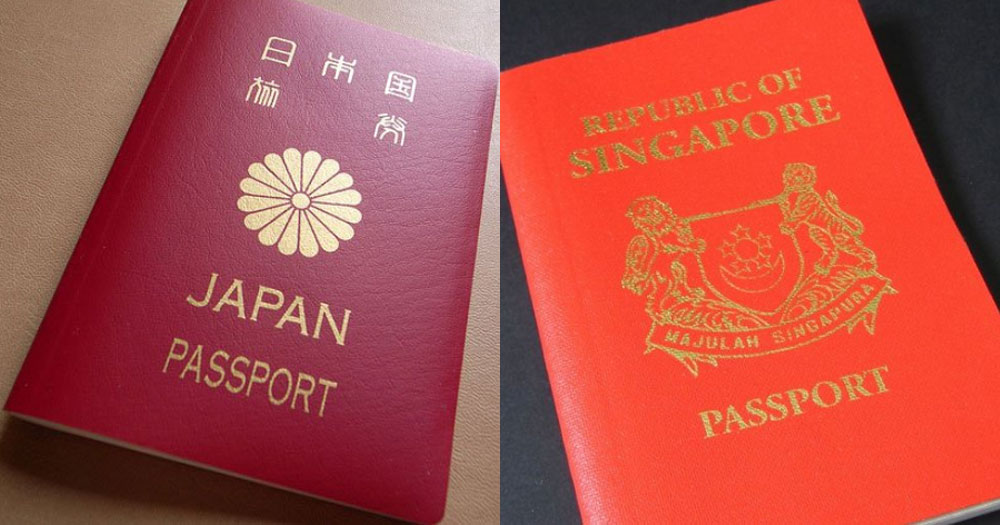Update, May 26, 2018: Kosovo has refuted the claim it does not allow Singapore passports visa-free travel. Kosovo said it does.
The battle for the world's most powerful passport rages on as Japan has beaten Singapore to claim the top spot in 2018.
This is based on the Henley Passport Index.
Singapore and Germany second
Japan now offers its citizens visa-free or visa-on-arrival access to a total of 189 destinations.
Singapore and Germany run a close second, allowing 188 destinations without a prior visa.
In an earlier ranking published in February, Singapore and Japan were tied for the top position, both allowing visa-free access to 180 destinations.
How Japan edged out Singapore
The Henley Passport Index retrieves exclusive data from the International Air Transport Association (IATA) to derive their rankings.
They have recently updated eight new territories and microstates to their rankings: Greenland, the Faroe Islands, Monaco, Andorra, Liechtenstein, Palestine, Vatican City, and San Marino.
All of these provide visa-free access to Japanese passport-holders.
In addition, Benin, a West African nation, has also relaxed its requirements for Japan, bringing Japan's total from 180 territories in the previous ranking to its current 189.
While the Singapore passport also provides visa-free access to these territories, it recently lost visa-free access to Kosovo, a disputed territory in Europe, which declared independence from Serbia in 2008. [Update: Kosovo said this is not true.]
This led to Singapore's fall in the rankings.
 Image via Encyclopedia Britannica
Image via Encyclopedia Britannica
How are rankings determined
Different research companies often use different criteria to rank passports.
The Henley Passport Index uses a simple scoring system to determine the rankings.
For each travel destination, if no visa is required for passport holders from a country or territory, then a score of 1 is created for that passport.
A score of 1 is also applied if passport holders can obtain a visa on arrival, a visitor’s permit, or an electronic travel authority (ETA) when entering the destination.
Where a visa is required, or where a passport holder has to obtain a government-approved electronic visa (e-Visa) before departure, a score of 0 is assigned.
A score of 0 is also assigned if passport holders need pre-departure government approval for a visa on arrival.
The total score is taken to be the sum of all the territories with a score of 1.
The index also assumes that the passport held is normal, rather than diplomatic. Diplomatic passports can sometimes make the difference in terms of whether a visa is required.
For example, as of April 2017, all holders of normal passports require a visa to visit North Korea.
However, holders of diplomatic passports of several countries, such as China and Russia, can enter North Korea visa-free.
Other rankings?
Although Singapore might be dethroned in this particular ranking, it remains the top contender in other rankings, such as Arton's Passport Index.
The index differs from the Henley Passport Index in several ways.
Firstly, it measures only the passports of the 193 United Nations member countries and six territories: Taiwan, Macau, Hong Kong, Kosovo, Palestinian Territory and the Vatican.
A total of 199 territories are considered, compared to 227 territories considered by the Henley Passport Index.
The main difference is that the Henley Passport Index considers a slew of microstates in its own rankings, some of which do not even issue their own passports.
For example, the Henley Passport Index considers French Polynesia as its own territory, while Arton's Passport Index considers it to be a part of France.
Arton's Passport Index arguably uses a more comprehensive methodology in determining its rankings as well. It uses a three-tier method to determine the rank.
Firstly, it takes into account a Visa-Free Score (VFS), which takes into account both visa-free (VF) and visa-on-arrival (VOA).
Next, it compares the VF portion of the score versus the VOA portion of the score.
Finally, the United Nations Development Programme Human Development Index (UNDP HDI) is used as the tie-breaker.
The UNDP HDI is a holistic measurement of a country's development and is a significant measure of the country's perception abroad.
Using this measure, Singapore is still considered the most powerful passport, with a VFS of 164.
South Korea is next in line with a score of 163, while familiar contenders Germany and Japan are ranked third with a score of 162.
 Image via Shutterstock
Image via Shutterstock
Rankings roller coaster
Regardless of which index is used, the rankings tend to fluctuate a lot.
This is because policies change quickly and many countries are keen to strengthen diplomatic efforts with others.
According to the Henley Passport Index, almost 40 visa-waiver agreements were signed by governments since the start of the year.
The United Arab Emirates (UAE) is placed 23rd and is the fastest overall climber on the index, ascending 38 places since 2008.
The country has secured more new visa-waivers for its citizens in 2018 than any other jurisdiction in the world.
This can be attributed to economic diversification away from the oil sector and towards the less volatile tourism industry. To achieve this, it is in the UAE's interest to open itself to as many countries as possible.
[related_story]
Certain global events may also cause normally closed-off countries to open their borders, albeit temporarily.
Russia has announced in April this year that it will offer a visa-waiver for all tourists holding tickets to the 2018 Fifa World Cup.
Thus, the strength of a nation's passport is largely dependent on the country's diplomatic efforts.
However, despite what others may say, do not be afraid to use your powerful passport for boring destinations.
Image via stock photos
If you like what you read, follow us on Facebook, Instagram, Twitter and Telegram to get the latest updates.
